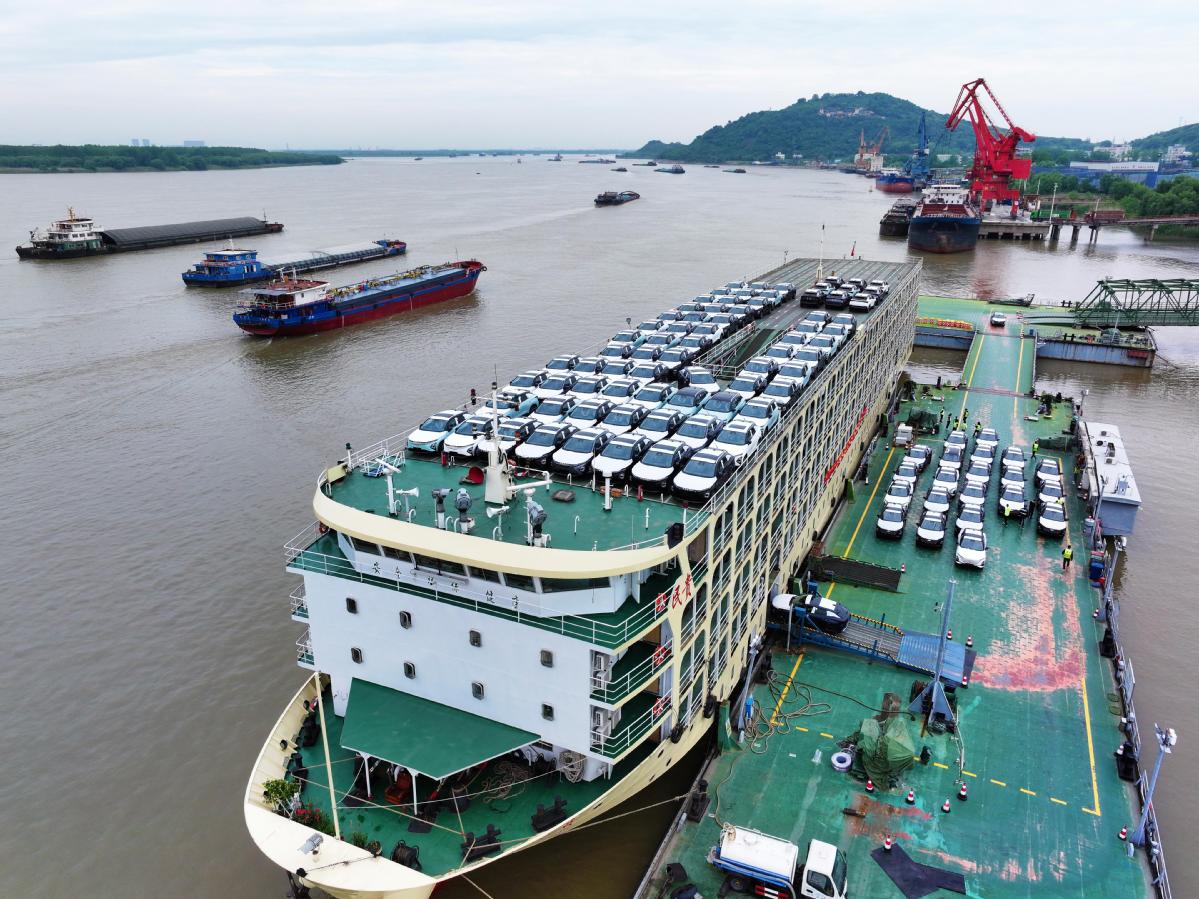
A ro-ro ship carrying Chery vehicles is set to travel to overseas markets from a port in Wuhu, Anhui province, in May. [WANG YUSHI/FOR CHINA DAILY]
Chinese makers of battery-powered electric vehicles are “gravely concerned” over any European Commission’s move to levy countervailing duties on the imports of battery electric vehicles (BEVs) from China, while they are seriously considering Europe as an investment destination, said the China Chamber of Commerce for Import and Export of Machinery and Electric Products on Friday.
A number of European countries want Chinese BEV makers to invest and set up factories in Europe.
The commission’s imposition of countervailing duties on Chinese BEV makers aims to hinder the export of Chinese products to Europe and thus encourage Chinese companies to invest in Europe and promote the development of the local automobile industry, help increase local employment and achieve green and sustainable development goals, the chamber said.
“Before it launched the anti-subsidy investigation into Chinese BEV makers, many Chinese companies had already started or planned to invest or operate in Europe,” said Shi Yonghong, vice-president of the chamber.
“Since the EC decided to impose temporary countervailing duties, Chinese companies have repeatedly expressed their strong opposition, as they have been concerned about the investigation result and the potential risks of investing in Europe,” Shi said.
The preliminary ruling contains numerous judgments lacking objectivity and fairness, and some procedural practices lack transparency, said the chamber.
The commission’s unreasonable findings in this preliminary ruling seriously violate the rules of the World Trade Organization and the EU’s anti-subsidy regulations, artificially labeling Chinese companies with so-called beneficiaries of subsidies.
The label identified by the EC in the investigation is likely to become an excuse for them to conduct further investigations, namely Foreign Subsidy Regulation investigations, into Chinese enterprises investing in Europe in the future, and such potential has caused deep concerns and worries among Chinese enterprises.
In October last year, the commission’s initiated an anti-subsidy investigation concerning imports of Chinese-made BEVs designed for the transport of persons. On July 4, it imposed provisional countervailing duties on BEV imports.
The duties applied to the Chinese producers range from 17.4 percent to 37.6 percent. The provisional countervailing duties would apply for a maximum of four months.
Within the period, a final decision has to be made on definitive duties through a vote by EU member states. Once adopted, the definitive duties will be in place for five years.
The chamber said the most important factor for attracting global investors, including China, to invest in Europe is that the European Union could provide a friendly and stable business environment.
Frequently launching various unfair and unjust investigations against enterprises will obviously intensify companies’ concerns about the business environment and investment risks in Europe, the chamber said.
“It would be in the best interests of everyone concerned to avoid imposing the countervailing duties. If the EC labels Chinese BEV makers as beneficiaries of government subsidies, it would have a negative impact on those companies, including power battery manufacturers,” Shi said.
He further added that EU member states that intended to attract Chinese investment would need to distinguish the relations clearly. Maintaining an open and fair market environment will be more attractive for Chinese companies.
Chinese BEV makers have been closely monitoring the progress of the investigation, and will assess the risks of investing in Europe based on the result.
The Sino-European automotive industry chain is interdependent and has broad prospects for cooperation. The chamber hopes that the European side will uphold an open and cooperative attitude, terminate the investigation as soon as possible, and support the comprehensive cooperation between the Chinese and European automotive industries.
Meanwhile, Brussels-headquartered China Chamber of Commerce to the EU recently issued a statement calling on China and the EU to resolve trade friction over BEVs. It said the electrification of European automobiles requires a fully competitive environment rather than protectionism. The successful development of the European automotive industry has been driven by competition of carmakers and their continuous innovation, it said.
The transformation in terms of electrification faced by European carmakers today is a challenge and opportunity for global carmakers as well, and the solution is competition and constant innovation, the statement said.
zhuwenqian@chinadaily.com.cn
